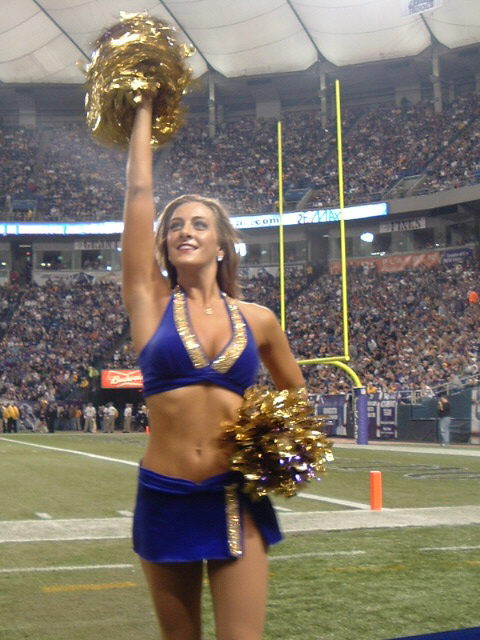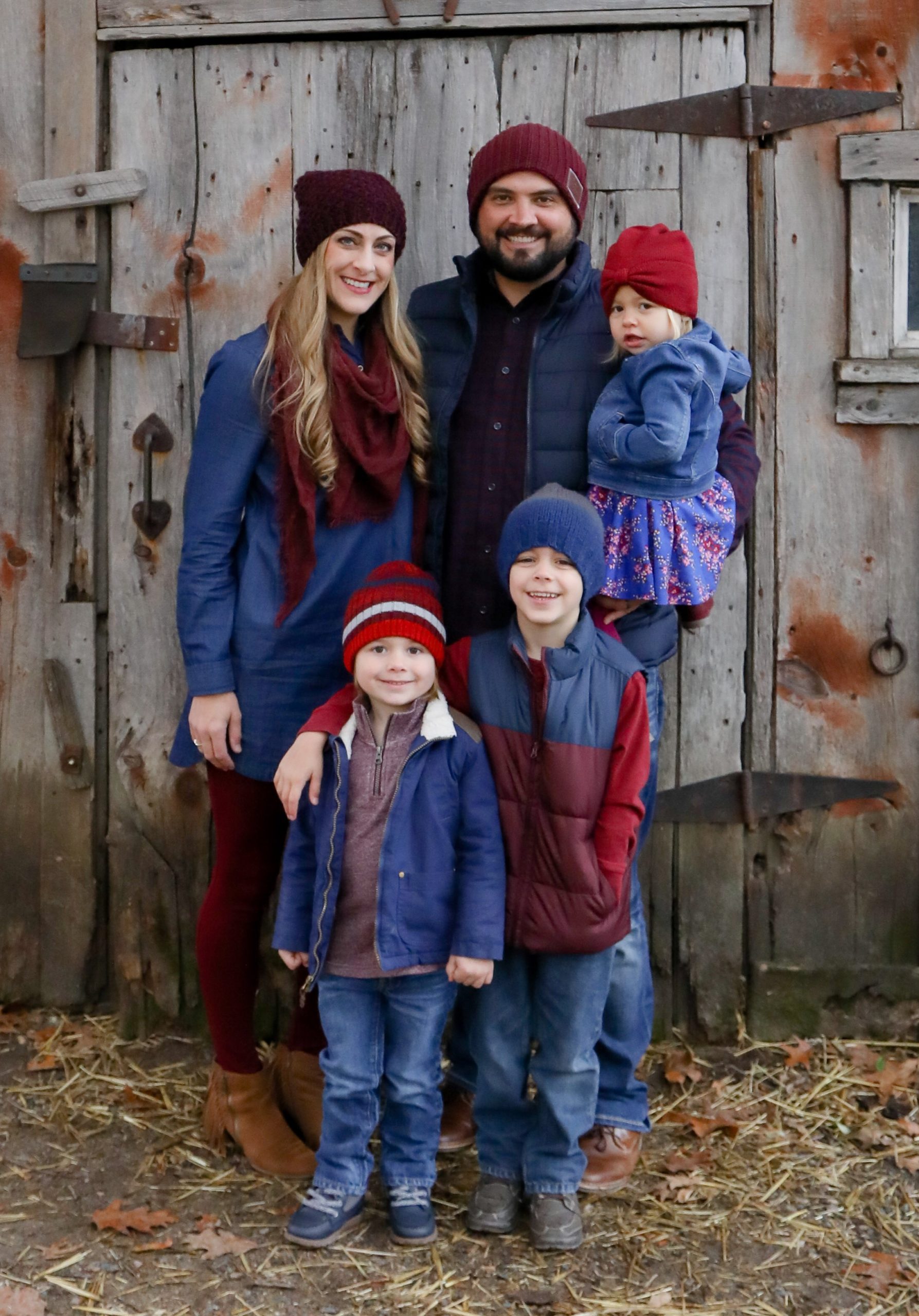From Minnesota Vikings NFL Cheerleader to Medical Cannabis Patient Advocate: Vireo’s Sarah Overby, LPN
Sarah Overby, LPN, is the Medical Science & Patient Liaison for Minnesota Medical Solutions, a subsidiary of Vireo Health. With Super Bowl LII happening this Sunday in Minneapolis, MN, we thought, who would be better to spotlight than a former NFL cheerleader turned medical cannabis educator and patient advocate?
Like many medical professionals, Sarah was initially highly skeptical of cannabis as a medicine. Through her personal journey, extensive research, and interaction with patients, Sarah has become an incredibly passionate advocate for medical cannabis.
Let’s learn more about Sarah’s background, what inspired her to get into the field, and how she feels about the NFL’s stance on medical marijuana.

Sarah Overby, LPN, the Medical Science & Patient Liaison for Minnesota Medical Solutions, a subsidiary of Vireo Health. She was previously a cheerleader for the Minnesota Vikings.
Jeremy Kossen: Sarah, it’s so good to talk to you. I’ve heard you have a very compelling story about how you went from NFL cheerleader to medical cannabis patient advocate. So let’s get started. Share a little bit about your background.
Sarah Overby, LPN: Well, where to begin? I’ve been in healthcare now for more than 20 years. I started my career in high school as a nurse aide in a nursing home in my home town of Hillsboro, North Dakota. I fell in love with nursing and pursued a nursing career in college. I was fortunate to serve patients as an LPN, which is a Licensed Practical Nurse, for over a decade. I worked in several different areas, everything from pediatrics, geriatrics, and women’s health to long-term health care and urgent care.
Jeremy: You were an NFL cheerleader for the Minnesota Vikings. What was that like? How did you become a cheerleader?
Sarah: I have an extensive dance background having trained in dance studios, being captain of my high school dance team and college dance team. Along with healthcare, dance has always been a passion of mine. About 13 years ago, while working as a nurse, I decided I wanted to pursue my dancing career on a professional level and auditioned for the Minnesota Vikings Cheerleaders.
When I auditioned for the Minnesota Vikings Cheerleaders I knew the organization required every member of the team to have a full-time job, be a full-time student, or a full-time mother. So, I knew that it was possible to do because everybody on the team was doing it. While it did make it very challenging to manage my schedule, it was worth it.
When you’re doing something you love, it doesn’t necessarily seem like a job. I was on the team for six years while working full-time as a nurse in Minnesota and had incredible experiences through the Vikings. I traveled across seas several times to visit the troops in Iraq and Afghanistan. I traveled to Mexico to cheer clinics, schools, and groups that didn’t even speak any English. I don’t speak Spanish, so, that was challenging, but, a fun experience nonetheless.

Sarah on an overseas trip with Vikings cheerleaders to visit American troops in Afghanistan.
Jeremy: How did you like working in the NFL and for the Vikings?
Sarah: It was a really fun time and a fantastic experience. The Minnesota Vikings are an incredible organization to be a part of and after I retired seven years ago, I’ve been staying involved as an Alumni. They have a competitive cheer team — kindergarten through senior-year — and I coached that team. I’ve judged auditions and helped with other events throughout the year.
Jeremy: Did you go straight into the medical cannabis field directly from nursing?
Sarah: Actually, a couple of years ago I came to a point where I wasn’t necessarily feeling challenged anymore in the role that I had for my nursing career, and I left healthcare for a couple of years. I went into sales and worked for a sports apparel company selling uniforms. Although I loved my work as a territory sales rep, I realized I missed the medical field so I took break from that to spent time with my family and pursue my passion of medicine. I’m thankful for the experience I gained. It was something that I hadn’t done before, but, I realized that it wasn’t something that drove me and motivated me.
Jeremy: Ah, and then you went into medical cannabis?
Sarah: Surprisingly, I missed healthcare. I didn’t think I would. I felt kind of burnt out at the time. But, I missed healthcare. I missed the whole aspect of helping people feel better, but, it was something different that I was searching for when I came back to healthcare. I had done years of direct patient contact and direct patient care. I wanted to combine my experience of leadership and public speaking through the Vikings, sales experience through the sportswear company and healthcare through nursing.
I thought, gosh, if there could just be a job out there that I would be able to wrap up all my experience and use it, that would just be amazing, right? For me, it seemed like this was an out of reach goal or just something too good to be true.
During that time and even before, I starting hearing about Medical Cannabis. To be completely honest and transparent with you, I was that person, very skeptical about Cannabis. I thought marijuana is illegal and I believed all of that stuff that stems from the war on drugs.
I heard about many success stories with medical cannabis, and it always seemed to come up in different conversations. I decided that I owed it to myself as a healthcare professional to do some research. I got curious. I thought, well, if I am hearing so much about it, there’s got to be something to this, right?
I did my own research on medical cannabis and its history. It just enthralled me; it was just an incredible story. The more I researched, the more interested I became. All these things that I believed weren’t necessarily true and everything just came to light. I thought, wow, if there was something I could do to be a part of this incredible thing that would be amazing

Sarah, husband Josh and children Breckston, Marty and Aurelia.
Jeremy: And, then you got involved with Vireo Health and Minnesota Medical Solutions?
Sarah: I got introduced to Minnesota Medical Solutions and Kyle [Kingsley, M.D.]. Actually, I got connected first with Stephen [Dahmer, M.D.], and we did a phone interview. I got to know a little more about the company, about what Vireo and Minnesota Medical Solutions were all about. He told me: “You know what? At the moment we don’t know if we have a position open, but, with your background, we think you’re someone we could use.” He said, “Go home, and I’ll talk to some of the other leadership here, and we’ll get back to you.” I ended up getting a call back and then I went in to meet with Kyle. After our meeting, he said, “You know what? We don’t have a position open, but, we need somebody like you; I’ll call you back in the morning. Right now, just go home and start learning everything you can about medical Cannabis.”
I went home and I started just doing more research. There is so much to know about cannabis, and it is changing every day. New research studies, new laws. Then Kyle called me the next day, and he said, “You know what? We want to hire you.” So basically, they hired me to do physician outreach and education. It was my job to reach out to physicians and spread the word about medical cannabis and teach healthcare professionals about it. I’ve now been working for Minnesota Medical Solutions since May of 2016, and I’m still learning things every day. It is my PASSION!
Jeremy: Are there particular areas of medical cannabis that you became passionate about, like, sometimes people are drawn to cancer, end-of-life care, or chronic pain or PTSD. Is there a particular area that you’re super passionate about?
Sarah: Definitely. When I was doing my research, the one thing that stood out and I was blown away by — it was kind of a no-brainer to me — like, why would people not want to try medical cannabis instead of opioids?
In my nursing career, I saw a lot of opioid addiction. I saw a lot of patients struggling with awful side effects. Even though they might have been getting pain relief, they were having some terrible side effects, whether it was just being numb or drugged up, and just not being aware of what’s going on, to constipation. It was unfortunate. It was sad, and opioids are scary. There’s a risk of drug interaction, there’s a risk of overdose, and as you probably know, the numbers of opioid overdose deaths is staggering.
When I learned that cannabis is safer and people were having relief and not having the side effects and that there had been not one recorded overdose death in the history of cannabis, I thought, what are people doing? Why aren’t they doing this? Why aren’t they trying medical cannabis?
The thing is, there’s a stigma out there, and there are skeptics out there, and that’s where I felt really driven to get the education out there and just to help people because I had been there. I was previously uneducated when it came to medical cannabis, and I think if I can just educate healthcare professionals and get that information out there I think they’re going to make their decision and they’re going to see that it’s not as bad as everybody thinks it is. It’s not that drug that gets you high from back in the 70s or so. My job started out doing outreach to physicians and I quickly realized that it wasn’t only physicians that were maybe curious about this. It was patients, it was community groups, and so my job quickly expanded to Medical Science and Patient Liaison.
Jeremy: What is your job role like?
Sarah: I speak with physicians and health care professionals on a daily basis offering education and support on all things medical cannabis related. I run patient support group meetings and work on patient success stories. It’s really fun to bring my nursing background into it and tie in my experience with the Vikings. When I was a Vikings cheerleader, I did a lot of public speaking, and now that I have this position with Minnesota Medical Solutions, I do a lot of lectures to college classes or rooms full of medical care providers.
And then there’s my sales background. I’m not a pharmaceutical sales rep; I’m more of an educator. But, it’s kind of like selling, right?
Jeremy: Definitely. Advocacy, in many ways, is selling.
Sarah: Right. Anyways, I didn’t know it at the time, and I didn’t know this job even existed, it is my dream job. It brings all my experience from the previous careers I had and all together, and I have just been loving it. I love helping patients. I love educating healthcare professionals, and I’m still involved with the Vikings. I’m helping out with the Super Bowl. I’m doing some appearances and helping out with the Super Bowl activities starting tomorrow. It’s been a fun ride. I’m so blessed, and I’m so thankful for the opportunity.
Jeremy: We’ve got the Super Bowl coming to Minnesota. Serious head injuries and brain diseases such TBI (traumatic brain injury) and CTE (chronic traumatic encephalopathy) are caused by repeated concussions and head trauma. One study showed 99% of deceased NFL players’ brains had CTE. We know that various cannabinoids can prevent these conditions from developing or that cannabis can treat them better than most other drugs. This has become a huge issue in the NFL. As someone who’s worked with the NFL for many years [and to be clear for readers, you’re not a spokesperson for them], but what are your thoughts about football players and medical cannabis?
Sarah: Personally, and while I certainly don’t speak for the company here, I completely support it. It’s tough when you have that big of an organization when you’re in the eye of the public, and it’s still a federally illegal drug. It’s tough for the NFL to support it as a whole, but, I love seeing individual players maybe softly speaking out about it or even loudly speaking out about it and putting it on their cleats. I think that the more research and education we do over the coming years, I think it’s going to be easier for the NFL to support.
Those are just my thoughts. I think it’s a great thing. I have heard stories of ex-NFL players that have been dealing with the repercussions of concussions.
They’re now finding a lot of relief and help where they might have gotten stuck with these other medications; or where they’ve come to the end of the road with therapy, having tried everything else and nothing helps. And now they’re using medical cannabis as a last resort, yet finding cannabis helps better than anything. It’s been really inspirational to hear some of those stories.
I was excited to see one of the games this past season. The players got to wear football cleats that promoted various causes or charities. I read an article about one of the players, and off the top of my head I cannot remember who it was or what team he was from [Derrick Morgan, LB, Tennessee Titans], actually was supporting medical cannabis on his cleats, which is really neat. It was the best of both worlds, my two passions coming together.
[ESPN: Derrick Morgan has researched medical cannabis, says it’s NFL’s turn]
Jeremy: Or maybe the NFL could at least allow CBD, which we know is not only non-intoxicating, it’s not addictive or habit-forming. In fact, studies demonstrate just the opposite. That it can prevent addiction to other substances like opioids.
Sarah: Exactly. I think that’s where a lot of the misinformation comes out because as I’m educating even healthcare providers, a lot of them do not know the differences between THC and CBD. They don’t know that there are two main components that we focus on in our medications.
THC is where you get those intoxicating effects, which most people are aware of from back in the day when people would smoke to get high. But, what surprises them most is that there is CBD, which has no intoxicating effects and can actually mute the side effects that you can get from THC. If a person needs THC to maybe help with pain or different things, but, they don’t want to feel high, they can go on medication that has some CBD in it to temper those effects.
Jeremy: Sarah, thank you so much for sharing your amazing experiences. It’s been a real pleasure getting to learn more about your background and journey from NFL cheerleader to medical cannabis patient advocate.
Sarah: Thanks, Jeremy. It was great talking to you, as well.
